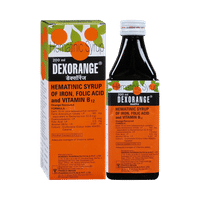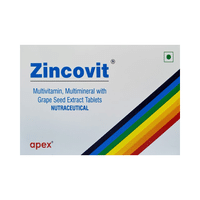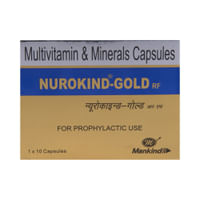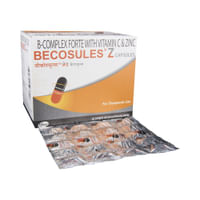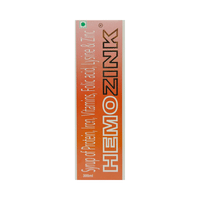Rs.302for 1 strip(s) (10 tablets each)
food interaction for Benfoceum-CD3
alcohol interaction for Benfoceum-CD3
pregnancy interaction for Benfoceum-CD3
lactation interaction for Benfoceum-CD3
food
alcohol
pregnancy
lactation
Benfoceum-CD3 Tablet may be taken with or without food.
None
None
CAUTION
Alcohol should be used with caution while taking Benfoceum-CD3 Tablet.
CAUTION
The safety of Benfoceum-CD3 Tablet during pregnancy has not been established. There are no adequate and well-controlled studies in pregnant women, and animal data on reproductive toxicity are insufficient. Your doctor will weigh the benefits and any potential risks before prescribing.
CONSULT YOUR DOCTOR
Benfoceum-CD3 Tablet should be used with caution during breastfeeding. Breastfeeding should be held until the treatment of the mother is completed and the drug is eliminated from the body.
CAUTION
SALT INFORMATION FOR Benfoceum-CD3
Alpha Lipoic Acid(100mg)
Uses
Alpha Lipoic Acid is used in nutritional deficiencies.
How it works
Alpha lipoic acid acts as a potent antioxidant (substance that protects against cell damage) by neutralizing the free radicals (waste products formed in the body during energy production) such as reactive oxygen and nitrogen species. Further, it initiates natural antioxidant processes in the body. It also maintains the levels of Vitamin E and Vitamin C in the body.
Common side effects
Nausea, Abdominal pain, Allergic reaction, Diarrhea, Vertigo, Vomiting
Benfotiamine(150mg)
Uses
Benfotiamine is used in the treatment of nutritional deficiencies.
How it works
Benfotiamine provides essential nutrients.
Common side effects
Allergic reaction, Gastrointestinal disorder, Nausea
Chromium Picolinate(200mcg)
Uses
Chromium Picolinate is used in the treatment of nutritional deficiencies.
Common side effects
Headache, Nausea, Dizziness, Bloating
Folic Acid(1.5mg)
Uses
Folic Acid is used in the treatment of anemia due to chronic kidney disease, iron deficiency anemia and anemia due to folic acid deficiency.
How it works
Folic Acid is a form of vitamin B. It plays a vital role in the formation of red blood cells, which carry oxygen throughout the body. It is also essential in pregnancy due to its role in the development of the unborn baby's brain and spinal cord.
Common side effects
No common side effects seen
Inositol(100mg)
Uses
How it works
Inositol
Common side effects
Limited data available
Methylcobalamin(1500mcg)
Uses
Methylcobalamin is used in vitamin B12 deficiency.
How it works
Methylcobalamin is a form of vitamin B12 that restores its level in the body thereby helping in treating certain anemias and nerve problems.
Common side effects
Decreased appetite, Diarrhea, Nausea, Rash
Pyridoxine Hydrochloride(3mg)
Uses
Pyridoxine Hydrochloride is used in the treatment of nutritional deficiencies.
Common side effects
Vitamin D3(1000IU)
Uses
Vitamin D3 is used in the treatment of Vitamin D deficiency and osteoporosis.
How it works
Vitamin D3 is a form of vitamin D. It raises vitamin D levels in your blood. This in turn raises calcium levels in your blood by helping you absorb more calcium from food.
Common side effects
Increased calcium in urine, Loss of appetite, Increased calcium level in blood, Itching, Rash, Urticaria, Facial swelling, Genital edema, Dry skin, Nail disorder, Erythematous rash, Decreased prothrombin level in blood, Difficulty in swallowing, Weakness, Fatigue, Sleepiness, Headache, Dryness in mouth, Metallic taste, Nausea, Vomiting
SUBSTITUTES FOR Benfoceum-CD3
10 Substitutes
10 Substitutes
Sorted By
 Rs. 233.40save 24% more per Tablet
Rs. 233.40save 24% more per Tablet Rs. 421.80pay 34% more per Tablet
Rs. 421.80pay 34% more per Tablet Rs. 262.50save 14% more per Tablet
Rs. 262.50save 14% more per Tablet Rs. 261.50save 18% more per Tablet
Rs. 261.50save 18% more per Tablet Rs. 248.40save 19% more per Tablet
Rs. 248.40save 19% more per Tablet
Expert advice FOR Benfoceum-CD3
- Food decreases the amount of alpha lipoic acid in the body; hence it should be taken on empty stomach about 1 hour before or 2 hours after consuming food.
- Do not take alpha lipoic acid supplements on your own and as a sole treatment for diabetes, complications of diabetes and other conditions in which benefit may be claimed, as these diseases require proper medical treatment.
Frequently asked questions FOR Benfoceum-CD3
Alpha Lipoic Acid
Q. Is Alpha Lipoic Acid a vitamin?
No, Alpha Lipoic Acid is not a vitamin
Q. Is Alpha Lipoic Acid an amino acid?
No, Alpha Lipoic Acid is not an amino acid
Q. Is Alpha Lipoic Acid natural?
Yes, Alpha Lipoic Acid is natural as it is synthesized in the human body, and in a wide variety of foods from plant and animal source
Benfotiamine
Q. What is Benfotiamine?
Benfotiamine is a dietary supplement of thiamine. It is also known as Vitamin B1. The medicine is used in the treatment of low levels of thiamine in the body. It protects the body from conditions which are caused due to low levels of thiamine such as heart, brain and nerve disorders.
Q. What does Benfotiamine do?
Benfotiamine contains vitamin B1. This vitamin is needed to process carbohydrates, fat and protein in the body. Our body requires vitamin B1 to form the fuel the body runs on i.e., adenosine triphosphate (ATP). Benfotiamine provides the necessary dose of vitamin B1 which is used by nerve cells in order to function normally.
Q. Who all are more likely to have deficiency of vitamin B1?
The levels of vitamin B1 in our body decline with age, irrespective of medical condition. Deficiency is most commonly found in alcoholics, people with malabsorption conditions, and those eating a very poor diet. It is also common in children with congenital heart disease. Individuals undergoing regular kidney dialysis may develop severe vitamin B1 deficiency, which can result in potentially fatal complications. So, it is advisable that persons receiving dialysis should discuss the need for the use of Benfotiamine with their physician.
Chromium Picolinate
Q. What is Chromium Picolinate used for?
Chromium Picolinate is a supplement used to support healthy blood sugar levels, particularly in people with chromium deficiency or type 2 diabetes. It may also be used for weight management and to improve metabolism.
Q. How should I take Chromium Picolinate?
Take one capsule daily, or as directed by your doctor, with or without food. Swallow the capsule whole with water and maintain a healthy diet and exercise routine for best results.
Q. Can I take Chromium Picolinate with other medications?
If you are under medications, particularly for diabetes, consult your doctor before starting Chromium Picolinate. It may affect blood sugar levels and enhance the effect of certain drugs.
Folic Acid
Q. Is it ok to take Folic Acid when not pregnant?
Usually, folic acid requirements are met from the diet and therefore additional supplements are not required. In general, Folic Acid is recommended only when you have a deficiency of folic acid. However, Folic Acid is advised to women who are pregnant and who want to conceive. The medicine should be taken at least 4 weeks before pregnancy and should continue its use up to 3 months of pregnancy. Consult your doctor if not sure.
Q. Can Folic Acid cause weight gain?
Animal studies on Folic Acid suggest that taking the medicine in excess along with a high-fat diet may lead to weight gain and fat accumulation. But this weight gain was not evident when taken along with a normal or low-fat diet, even with excess Folic Acid. In humans, similar studies have not been conducted and therefore knowledge regarding weight gain is lacking. Therefore, if you are on Folic Acid eat a low-fat meal to be on the safer side.
Q. How long does Folic Acid take to work?
Folic Acid usually starts working within a few hours of taking it. If you are taking it for iron deficiency anemia, you may start feeling better after a few weeks of taking it. In case you are taking it during pregnancy, you may not notice any difference but this does not mean that the dose is not working. Continue taking Folic Acid for the duration recommended by your doctor.
Inositol
Methylcobalamin
Q. What is Methylcobalamin?
Methylcobalamin contains vitamin B12. Vitamin B12 is an essential nutrient which is required by the body to make red blood cells and maintain a healthy nervous system. It is also important for releasing energy from food and using vitamin B11 (folic acid).
Q. Why can’t I get sufficient vitamin B12 from my diet?
You can get vitamin B12 from sources like meat, fish, eggs and dairy products. While people who are vegetarian or vegan may not get Vitamin B12 as it is not found naturally in foods such as fruits, vegetables and grains. Therefore, deficiency of Vitamin B12 is usually noticed in vegetarians or vegans.
Q. What happens if I have vitamin B12 deficiency?
Deficiency of vitamin B12 may cause tiredness, weakness, constipation, loss of appetite, weight loss and megaloblastic anemia (a condition when red blood cells become larger in size than normal). It may also lead to nerve problems such as numbness and tingling in the hands and feet. Other symptoms of vitamin B12 deficiency may include problems with balance, depression, confusion, dementia, poor memory and soreness of the mouth or tongue.
Pyridoxine Hydrochloride
Vitamin D3
Q. Is it better to take Vitamin D3 at night or in the morning?
You can take Vitamin D3 at any time of the day, morning, or night. However, there is limited information available about the best time to take Vitamin D3. Take it exactly as advised by your doctor.
Q. What are the benefits of taking Vitamin D3?
Vitamin D3 is important for maintaining bone health, support the health of the immune system, brain, and nervous system. It also regulates insulin levels and is also important for a healthy heart and blood vessels.
Q. How should Vitamin D3 be taken?
Vitamin D3 should be swallowed whole with water and should not be crushed or chewed. It is advised to take it with the main meal of the day to increase its absorption.














